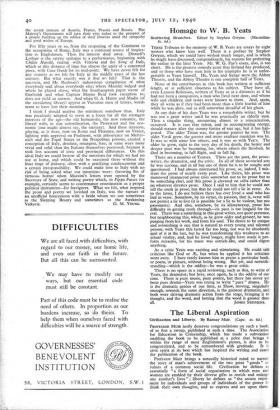Homage to W. B. Yeats
THESE Tributes to the memory of W. B. Yeats are essays by eight writers who knew him well. There is a preface by Stepher
Gwynn, which we could have wished much longer, and in which he might have discussed, compendiously, his reasons for preferring the earlier to the later Yeats. Mr. W. G. Fay's essay, also, is too short. He is the greatest comedy actor that Ireland has produced, and to those who have seen him in his triumphs he is as unfor- gettable as Yeats himself. He, Yeats and Synge were the Abbey Theatre, and the Abbey Theatre is one complete half of Yeats.
None of the contributors to this book has written at sufficient length, or at sufficient closeness to his subject. They have all, even Lennox Robinson, written of Yeats as at a distance; as if he had not been a companion, a man who lived next door, and whose wife and children and tastes were known to them. And, again, they all write as if they had been more than a little fearful of him while he was alive, and as still somewhat dreadful of his ghost.
At any date of his days Yeats was a remarkable writer, but he was not a great writer until he was practically an elderly man. Then a singular thing, amounting almost to a reincarnation, occurred. It is rare that talent, and its accompanying energy, should mature after the stormy forties of our age, but it has hap- pened. The older Titian was, the greater painter he was. The older Verdi grew, the greater and more exultant musician was he. It was so with some few others, and it was so with Yeats. The older he grew, right to the very day of his death, the better and deeper poet was he becoming, for, where others die finished, he died in becoming, in full flight, and in full fig.
There are a number of Yeatses. There are the poet, the prose- writer, the dramatist, and the critic. In all of these so-varied arts he was curious, and in all but one of them he is to be sought and questioned. I had always mistrusted his prose, as, indeed, I mis- trust the prose of nearly every poet. Like theirs, his prose was mannered (mannered prose tries somewhat not to be prose but to be something else), and this prose is elevated on stilts rather than on whatever elevates prose. Once I said to him that he could not tell the truth in prose, but that he could not tell a lie in verse. As to the latter, I do not believe there has ever lived a soul who has lied in verse. Somehow, by its virtue, its passion, that is, verse will not permit a lie to live (it is possible for a lie to be violent, but not passionate). And also, somehow, by its idiosyncrasy, prose has difficulty in getting truth through—its pace is too languid for the real. There was a something in this great writer, not quite pretence, but neighbouring this, which, as he grew older and greater, he was purging from his work, and from his soul. The desire to be unique and astonishing is one that is natural to every young and talented person; with Yeats this lasted far too long, nor was he absolutely quit of it at the last, but he was transforming this weakness to an actual vitality, and, had he lived longer, might have made it per- form miracles, for his muse was ostrich-like, and could digest anything.
As a critic Yeats was exciting and stimulating. He could talk criticism like God or IE., but when he applied it his criticism went awry. I have rarely known him to praise a particular book, or poem, or picture, without being wrong. But yet, and notwith- standing—which is the oddity—he was a great critic.
There is no space in a rapid reviewing, such as this, to write of Yeats, the dramatist; but here, once again, he is the oddity of our time. There is pure music, pure poetry, but there has never yet been pure drama—Yeats was trying to write " pure " drama. He is the dramatic genius of our time, as Shaw, moving, singularly enough, towards the same direction, is the greatest dramatist, and both were driving dramatic action from the stage, bringing it to thought, and the word, and betting that the word is greater than


























 Previous page
Previous page